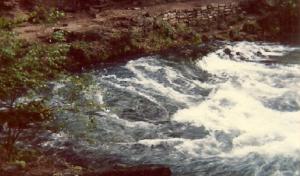Jesus never spoke one word about conserving the environment. But I firmly believe it is an insult to the Creator to trash the Creator’s masterpiece. From the rain forests of Oregon to the spring-fed streams of the Missouri Ozarks to the prairie grass of Iowa, I see God’s reflection everywhere in the beauty of creation, and I want to keep it that way. Because I am a “conserve-ative,” it is only logical for me to want to conserve God’s creation.

I first penned my thoughts on God’s word and the environment seven years ago in the Presbyterian Outlook (http://pres-outlook.org/2010/11/conserving-gods-masterpiece/). In addition to what I said there (little of which needs to be changed), I would like to dig deeper into the meaning of the two key verbs in the creation mandate.
God has charged us to manage the earth faithfully. The term “subdue” (kabash) in Genesis 1:28 is used a total of fifteen times in the Hebrew Bible; its basic meaning is to bring hostile forces under control, such as the inhabitants of Canaan (Joshua 18:1), or to bring people into subjection as slaves (Nehemiah 5:5, Jeremiah 34:11). One memorable verse is where Haman falls on the couch to beg Queen Esther for his life, and the king roars, “Will he even assault the queen in my presence?” (Esther 7:8) Another remarkable verse is where Micah rejoices over the day when God will “subdue” our iniquities (Micah 7:19).
The term “have dominion” (radah) is used a total of 22 times in the Hebrew Bible; its basic meaning is to manage with authority, like Solomon ruling his empire (1 Kings 5:4). Likewise, Psalm 72:8 says of the king, “May he rule from sea to sea.” Surprisingly, in Psalm 68:28, it is Benjamin that “rules” the other tribes. Israelites are forbidden to “rule” their slaves with harshness (Leviticus 25:43, 25:46, 25:53). In Leviticus 26:17, Israel is warned that if they sin, their enemies shall “rule” over them. And in Jeremiah 5:31, we are told that the prophets prophesy falsely, and the priests “rule” at their direction.
These two verbs in the creation mandate teach that we are not to let nature tyrannize us, but that we must exercise faithful management thereof for the good of humankind. Extreme environmentalism would demand that we sacrifice human lives and health on a mass scale for the dubious good of an earth that hardly merits human sacrifice. God’s word does not give us license to squash whatever threatens the comfort or convenience of our lifestyle, but it does teach us that we must subdue threats to human life, because we care for those who are made in God’s image.
Sadly, some have misunderstood the creation mandate as a command to run roughshod over creation, to bulldoze it to death as we see fit, as if we had better ideas than the Creator, like the old cartoon of a Corps of Engineers commander on a project saying, “This is what God would have done if he’d had Federal funds.” When I was a teenager, I had a bumper sticker that opposed the proposed Meramec Dam, which would have flooded miles of beautiful river, plus one of the largest caves in Missouri. I have always passionately opposed the mindless dredge-it-and-dam-it approach to God’s creation.
I seek to live a lifestyle that does as little damage to this planet as possible. Our family recycles, even when it is cheaper or more convenient not to do so. We drive two Hondas that get 40-45 miles per gallon on the highway. Our gas/electric bill varies from $80 to $160 a month. We have a microscopic carbon footprint compared to Al Gore’s.
But the only reason I conserve is because I believe God has put only so much coal and oil in the ground, which we have no right or excuse to waste. I refuse to buy into the global warming hysteria, whose credibility has been severely damaged by the East Anglia e-mails that revealed shameless cooking of the data. The earth may or may not be getting warmer, and we may or may not be contributing much to it.
But even if it were all true, who is to say that our present sea level is God-ordained? Why not go back to its original level – whatever that was? And although I hate to let go of plants and animals that are threatened with extinction, who is to say whether God insists that we preserve all species that now exist at any and all costs, seeing that God either allowed or planned that many of those species would become extinct before the human race came into being?
Much as we do well to assist endangered species that are poorly adapted for survival, to prioritize them over human life and health is downright idolatry, to set them up as false objects of worship. That is, unless we concede to human beings the right to make such a judgment call as a part of the management responsibility over creation. But if we concede to humans the inalienable right to exercise such responsibility, then the floor is open to debate whether Genesis’s commands to prioritize human life should outweigh other needs.
One problem with environmental extremism is that it depends on blind faith in a “science” that is a moving target and is therefore quickly outdated. “Science” is treated as God’s word until proven to be otherwise, and all contrary evidence is twisted and tortured to make the evidence fit the scientist’s political preconceptions. But if today’s “science” can be so rapidly debunked by tomorrow’s science, how can we base divine imperatives on it?
Sadly, today’s environmental extremism is exhibiting the worst traits that it condemns in others. It uses apocalyptic scare tactics that would make any Bible prophecy fanatic blush. People who would never invade bedrooms to dictate anyone’s moral behavior, want to impose environmental Shari’a on us. They bully us into buying light bulbs with mercury in them to “save the earth,” thus tripling the toxic waste in our trashcans. (Go figure!) They want to ban American oil drilling in the Gulf of Mexico, but they don’t care if Cuba, Mexico, Brazil, or China drills there.
Seriously, if we really want to save the planet, we should ban lawn mowing and drive-throughs, both of which waste huge amounts of fuel. (I don’t do drive-throughs, and would be glad to replace lawns with prairie grass or ivy.)
Our desire to faithfully care for God’s masterpiece gains credibility when we avoid tying it to questionable claims of a science that may soon prove itself wrong, and when we avoid preaching, or imposing on others, what we ourselves do not practice.












